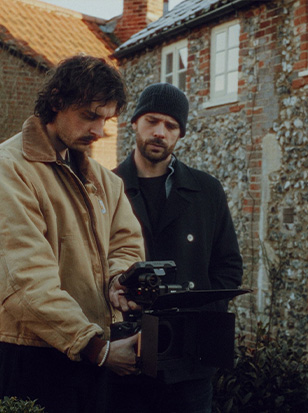
Josh and Matty Trett
- Job title: Commercial filmmakers
- Website: trettfilms.com
- Instagram: @trettfilms
- Related jobs: Editor, producer, director, runner, camera operator, boom operator
It’s fair to say that Josh and Matty Trett live and breathe film. Having been obsessed with the medium since they were kids, they have gone on to co-found and run a successful video production agency in Norwich — Trett Films.
Here, they take their lifelong passion for cinema and channel it into producing thrilling and dynamic video content for a huge range of clients, including huge brands like Sainsbury's, Virgin Atlantic, KPMG and many more. They’ve even produced videos for the David Lynch Foundation — a huge moment for Matty Trett, who counts the visionary Twin Peaks director as one of his personal filmmaking heroes.
I spoke to Josh and Matty to learn more about how their journey into filmmaking has unfolded — how they made the leap into running their own business, how they stay both busy and sane in a challenging environment, and what advice they have for anyone looking to make the leap for themselves. You can read our conversation — which has been lightly edited for length and clarity — after the jump.
Jon Stapley: How did your careers in the filmmaking industry start out?
Josh Trett: It’s weird — we went separately, then met once some years had passed. We started off making films because we grew up in a countryside area of Norfolk where there was no public transport. Norwich was the nearest place, but we didn’t have any disposable income or any way to get there. You had to make your own fun, so we grew up making films out of boredom, mostly.
I was a couple of years ahead of Matty, and I went to uni and he didn’t. So there was this time gap in terms of where our careers were at for a little while — we were both doing freelance stuff separately, then we were both employed at different agencies, and I was a teacher for a couple of years as well. There were all these different things we were doing separately, until five years ago, we decided to do Trett Films full time.
Matty Trett: I was doing YouTube content for an entrepreneur, then I went to work with one of our local production companies, who at the time were quite big.
Josh: As a teacher I taught film production and games design, which helped in terms of the communication aspect of what we do now. After that I was brought into a B2B magazine company to build the video team, and I had to design what their corporate video looked like. That was a good opportunity to work with some huge companies; I travelled the world in that job, from Hong Kong to Toronto and all around Europe, and worked with companies like Vodafone and GoCompare, loads of big conglomerates.
That experience really helped in shaping the corporate videos we do now. But it also taught me what I didn't want to do when going into running my own business as well.
Matty: We kept doing our own stuff while working for other people. We continued doing our own films, making bits on the side for £50 or whatever anyone would pay us. I remember when I was still working in one job, I was saving up all my holiday pay, and then I took all that money and bought my first camera — which was from Wex, actually! I bought a Canon EOS 600D I think — or something in that range.
JS: Was it a bit of an adjustment to learn how to work together?
Josh: Yes and no. Obviously we grew up together, so we knew each other’s personalities. But when we started the business, one thing it allowed us to do was focus on the things we were good at. Luckily we don’t both do the exact same things, so it works quite well.
JS: Yes, as I understand it, Matty, you’re more on cinematography and the visual side of things? While Josh, you look more at the overall picture?
Josh: I’ll generally develop scripts and concepts, work with clients to develop what they want to achieve. If it’s a project where there needs to be a director, I’ll generally direct. Matty, under his role as creative director, will do a lot of the cinematography.
Matty: I do the majority of the editing for the projects as well. We do pretty much everything in-house, so I’m doing all the colour grading and that sort of thing. We bring people on sometimes to help out, like a camera assistant, or we’ve had sound done professionally for a film. But it’s mostly just us two.
View this post on Instagram
JS: As you mentioned, it was five years ago that you made the jump to doing Trett Films full-time. Was it quite nerve-racking to make that leap?
Josh: I didn’t think it was [at the time]. Now, I know how the world of running a business works. And in those five years, COVID happened. So now I think I’m a lot more aware of what the world can throw at you. Whereas back then I had this naivety where I was like, “It has to work out, right? It can’t not!”
Matty: It’s been five years — I’m reaching thirty, Josh is just past thirty-two. So we were both at that kind of age where you could take those risks. We didn’t have kids, we weren’t married. And we’d started building up a lot of work already — I remember my boss at the time getting a little bit annoyed at me constantly taking leave to go and shoot stuff.
Josh: I used up all my holiday pay; I took an unpaid leave to focus on projects; I was sneaking off into the toilets to make calls and using my lunch breaks to run to meetings. It got to the point where we had to crap or get off the pot, really. Either we jumped and chased it, or we let it all go, because what we were doing wasn’t sustainable.
JS: How did you market yourself in the beginning — was it social media, or more word of mouth?
Matty: A lot of it was word of mouth. We’d be working with clients, and put the work out, and then other clients in a similar sector would see it and be like, “Oh, we want that as well.”
Josh: We’d like to think our work stands out a little bit more than some of our competitors in a similar realm. If we’re producing a corporate video, we try to push that there’s a filmmaker voice behind it, making it special — a creative voice to make this particular client’s project better. That was always what we're trying to push — this isn't just a corporate video to tick a box. This is a corporate video, done really well. This is what we're trying to present.
JS: I’d imagine that must be the interesting challenge: how to do something interesting and creative that is also what the client actually wants. Sainsbury’s, for instance, doesn’t want a David Lynch film, but they do want something with that kind of inventiveness, made by someone who can think a little differently.
Josh: That’s always the balance. How much can we bring to the table, versus how much should we just deliver what’s on the brief? And, five years in, I don't think we've really found a magic solution to that. It’s a case-by-case basis.
Matty: I think we can kind of tell through who the client is. You can tell that some clients, just by who they are and what they’re already putting out, might want something that is pushing the line in being a little bit different.
View this post on Instagram
JS: What have been the most challenging moments of your careers — difficult things that you’ve had to overcome or work around?
Matty: When you start a business, one of the hardest things to learn is dealing with clients. You can’t learn that without going through a few bad experiences, and you need those to happen in a way, as they’ll make you stronger. That’s one of the biggest challenges we’ve faced.
Josh: A lot of the time you want to be a yes-man — you want to say yes and please everyone so you can get paid, right? That’s a short-term solution, but long-term for a business, it doesn’t really work. What's nice about it though is that there is light at the end of the tunnel in that aspect. Because most of the clients we work with now, they like what we do, and we get on with them… everyone wins, everyone's happy, the work is good, the clients are happy with the work. But you had to work out who you can and can’t work with to get to that point. And that’s going to be different for everyone.
JS: And at the other end of the scale, what have been the proudest moments of your career?
Matty: [Working with] the David Lynch Foundation — that was an amazing client to work with because it felt like coming full circle, as he was a filmmaker that really pushed me to want to do it. Same with Ian Fleming Publications — from watching James Bond films when we were younger to being part of that franchise.
Josh: Being able to do this as a job is a lucky position. Obviously we work hard all the time, but also, I don’t take it for granted. Often when you tell people what your job is and tell them you’re a filmmaker, they always say, “I’ll remember you when your name’s up in lights!” And I’m like, I’d rather you were happy for me now! Because it was hard enough to get to this point.
Just to have the business go for five years, and to be able to work with all the clients we work with, is a privileged place to be in.
Matty: Before we started the business, people would tell me, “You shouldn’t do what you love as your business.” I honestly think that’s some of the worst advice. If you’re going to start a business, and you don’t just want to make tons of money but want to actually have a career you like, of course it’s got to be doing the thing you like.
Josh: Everyone talks about business growth when you first start. “Where do you see yourself in five years? What's the scale going to be? What is your business plan for growth?” All this kind of stuff. But very few people talk about business sustainability. And because we’re so small we can be dynamic – grow for a project, then shrink down when we need to. That means we can ride out storms like COVID, or any weird economic things that are going on.
Some companies — video production or similar sort of creative marketing companies — I see them get really busy, and they scale up really quickly, and then they can't sustain that as the future comes and goes. They either have to cut back or change what their output and offer is. We haven't had to do that, because we've kept what we offer as strong as possible, but not tried to blow it up with too many people and too many moving parts.
Matty: That’s also a benefit for our clients. Because whether we’re shooting an internal video of someone talking to camera, or a James Bond promotional video, they’re all shot with the same love and attention. We’re not a huge business; we’re not passing stuff down to our little minions so they can edit it really quickly. It’s all made by us. Everything gets that same attention.
JS: If you were faced with someone saying, “I’d love to get into commercial filmmaking, but where the hell do I start?” what would you say to them?
Matty: I used to do jobs for £250 — filming talks, gigs, things people wanted filming. If you can, get your hands on a camera — rent one, or if you can’t, get a cheap entry-level camera. If it’s not a gig or anything, but is just a simple promotional video, you can film it on your phone. So I’d say take whatever you can. Even if it’s not stuff you want to be doing, it’s experience, and then you’ve got clients who can give you a testimonial. And then maybe they know someone who has a bit of budget, who can kick you in the right direction.
Josh: You have to start on those smaller projects, learn how to cut your teeth through filming gigs and that kind of thing. As much as you can, try not to be taken advantage of. There will be people out there who try to milk you for all you’re worth, particularly when you’re young and upcoming.
Also, the thing that I wish I’d known is that everyone's trajectory is going to be different. Some people might get a career straight away, and it might take someone else several years. I was a teacher for years, and that was a pause in terms of me going down the route of production. But I got there eventually. It’s hard in terms of comparing yourself to others’ success. It’s just a matter of time, and it's not always going to be in the exact timeline you want it to be.
View this post on Instagram
JS: I think not letting people take advantage of you is very hard in any creative pursuit. How do you feel about the idea of working for free, perhaps for the sake of getting something in the portfolio? Is it something you’ve done, or would do?
Matty: We have done work for free, especially early on. If we’d worked with a client and they asked for a favour done, just to edit a video or something, we’d think, “Well, you’ve given us loads of work this year, so yes, okay.” When you do that, even if it’s someone you have a good working relationship with, you still need to stand your ground. Because you can say yes to one free thing, and suddenly, you’re not going to get paid for anything.
Josh: I think on a lot of things, go with what your gut says. If your gut is giving you bad vibes… you shouldn’t feel ashamed to say no. Don’t feel bad about walking away from something if it’s not right.
JS: And finally, any last lessons you think could be useful for aspiring filmmakers?
Josh: There’s this mentality of the “grind” now for the entrepreneur. Get up at 4AM, work seven days a week — that’s not sustainable.
It’s consistency. It’s not about getting up at 4AM, but about keeping on going day after day, year after year… get up the next day and brush yourself off.
Matty: If I were editing, and I got up at 4AM, started editing, and didn’t finish until twelve o’clock that night, [my edits] wouldn’t be good. My edits are better if I'm in the mood to edit, and naturally sometimes you're just not in the mood. It's the same as writing — you’re not always in that writing mood. So you don't have to feel like you're constantly an editing machine. If you want to do two hours of editing in a day, and you can't really get anything else out and nothing’s sticking together, then just just do two hours. That's better than 24 hours of crap really, isn't it?
View this post on Instagram
About the Author
Jon Stapley is a London-based freelance writer and journalist who covers photography, art and technology. When not writing about cameras, Jon is a keen photographer who captures the world using his Olympus XA2. His creativity extends to works of fiction and other creative writing, all of which can be found on his website www.jonstapley.com
Sign up for our newsletter today!
- Subscribe for exclusive discounts and special offers
- Receive our monthly content roundups
- Get the latest news and know-how from our experts




